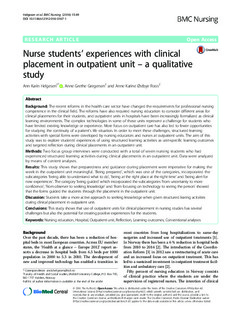| dc.description.abstract | Background: The recent reforms in the health care sector have changed the requirements for professional nursing competence in the clinical field. The reforms have also required nursing education to consider different areas for clinical placements for their students, and outpatient units in hospitals have been increasingly formalized as clinical learning environments. The complex technologies in some of these units represent a challenge for students who have limited existing knowledge or experience. More focus on outpatient care has also led to fewer opportunities for studying the continuity of a patient’s life situation. In order to meet these challenges, structured learning activities with special forms were developed by nursing educators and nurses at outpatient units. The aim of this study was to explore students' experiences of using structured learning activities as unit-specific learning outcomes
and targeted reflection during clinical placements in an outpatient unit.
Methods: Two focus group interviews were conducted with a total of seven nursing students who had
experienced structured learning activities during clinical placements in an outpatient unit. Data were analyzed by means of content analyses.
Results: This study shows that preparedness and guidance during placement were imperative for making the week in the outpatient unit meaningful. ‘Being prepared’, which was one of the categories, incorporated the subcategories ‘being able to understand what to do’, ‘being at the right place at the right time’ and ‘being alert for new experiences’. The category ‘being guided’ which incorporated the subcategories ‘from uncertainty to more confidence’, ‘from observer to seeking knowledge’ and ‘from focusing on technology to seeing the person’ showed that the forms guided the students through the placement in the outpatient unit.
Discussion: Students take a more active approach to seeking knowledge when given structured learing activities during clinical placement in outpatient unit.
Conclusions: This study shows that use of outpatient units for clinical placement in nursing studies has several challenges but also the potential for creating positive experiences for the students. | nb_NO |
